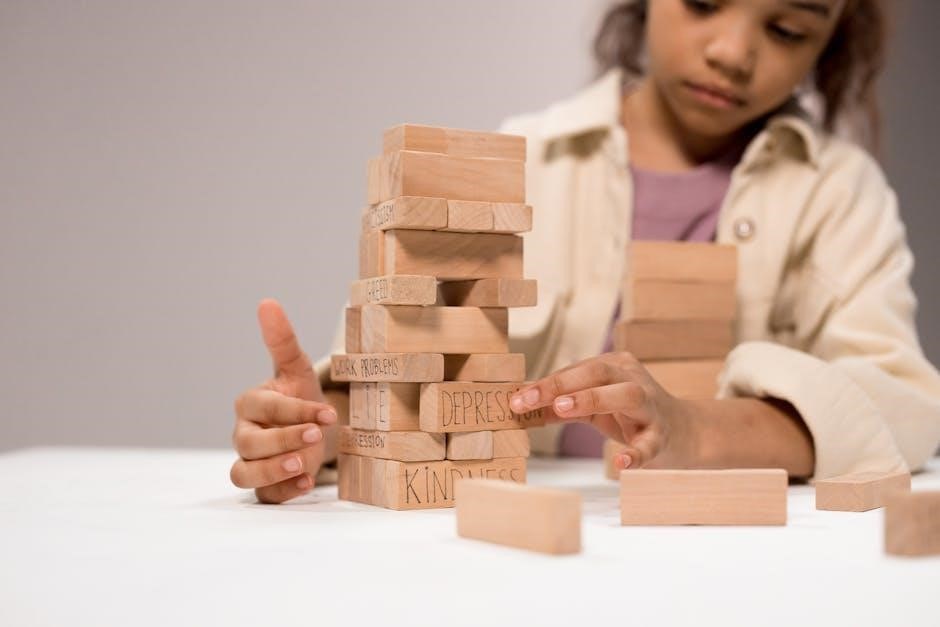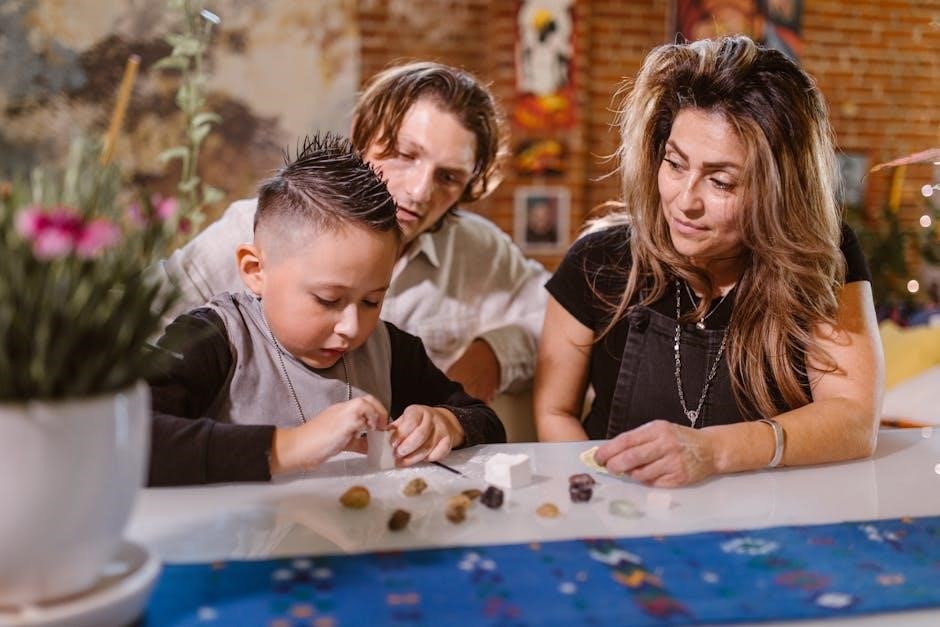Therapy Jenga is an innovative therapeutic tool that modifies the classic game by adding thought-provoking questions to each block‚ fostering open dialogue and self-reflection in a fun‚ engaging way.
1.1 What is Therapy Jenga?
Therapy Jenga is a therapeutic adaptation of the classic Jenga game‚ where each block contains thought-provoking questions designed to encourage self-reflection‚ emotional expression‚ and meaningful conversations. It serves as a tool for therapists to facilitate open dialogue and engagement in a fun‚ non-intimidating manner during sessions.
1.2 Origins and Purpose of Therapy Jenga
Therapy Jenga originated as a creative adaptation of the classic Jenga game‚ designed to encourage meaningful conversations and emotional exploration. Its purpose is to provide a non-threatening way for clients to engage in therapy‚ fostering trust and self-reflection through thoughtfully crafted questions printed on each block‚ available as downloadable PDFs.

Benefits of Using Therapy Jenga
Therapy Jenga fosters open dialogue‚ builds trust‚ and engages clients of all ages with its interactive‚ low-pressure approach‚ making it an effective tool for therapeutic conversations and self-reflection.
2.1 Encourages Open Dialogue and Self-Reflection
Therapy Jenga’s question-based blocks create a safe space for clients to express thoughts and emotions‚ encouraging meaningful conversations and deeper self-awareness through engaging and thought-provoking prompts tailored to individual needs.
2.2 Builds Trust and Rapport in Therapy Sessions
Therapy Jenga fosters trust and rapport by creating a collaborative‚ non-threatening environment where clients feel comfortable sharing their thoughts and emotions‚ helping to strengthen the therapeutic relationship through interactive and engaging activities.
2.3 Engages Clients of All Ages‚ Including Kids and Teens
Therapy Jenga captivates clients of all ages‚ especially children and teenagers‚ by transforming traditional therapy into a playful‚ interactive experience‚ making it easier for younger clients to express themselves and participate actively in their therapeutic journey.
How to Create Your Own Therapy Jenga Game
Create a personalized Therapy Jenga game by printing and cutting questions‚ then attaching them to Jenga blocks using mod-podge. Customize questions to suit client needs for effective therapy sessions.
3.1 Materials Needed: Jenga Blocks‚ Questions‚ and Mod Podge
To create Therapy Jenga‚ you’ll need a standard set of Jenga blocks‚ pre-made or custom questions printed on paper‚ and mod-podge to securely attach the questions to the blocks. Optional materials include scissors‚ a printer‚ and laminator for durability. Ensure blocks are clean and dry before applying questions for a long-lasting finish.
3.2 Step-by-Step Guide to Assembling the Game
Print your selected questions on paper. 2. Cut them into sizes fitting the Jenga blocks. 3. Apply a thin layer of mod-podge to each block. 4. Attach the question to the block‚ smoothing out air bubbles. 5. Let dry overnight. 6. Repeat for all blocks. Optionally‚ laminate questions for durability before attaching.
3.3 Tips for Customizing Questions Based on Client Needs
Tailor questions to suit different age groups and therapeutic goals. For children‚ include fun‚ engaging prompts. For teens‚ focus on identity and emotional exploration. Adults benefit from open-ended‚ reflective questions. Categorize questions by theme (e.g.‚ icebreakers‚ emotional depth) and ensure clarity. Laminate questions for durability. Adapt examples from Therapy Jenga PDF resources.
Categories of Therapy Jenga Questions
Therapy Jenga questions are categorized into icebreakers‚ deep emotional prompts‚ and activity-based skill development‚ ensuring a diverse approach to address various therapeutic needs and client goals effectively.
4.1 Icebreaker Questions for Initial Sessions
Icebreaker questions in Therapy Jenga are designed to create a comfortable atmosphere‚ helping clients feel at ease. These fun‚ lighthearted prompts encourage sharing and laughter‚ making it easier for clients to open up during initial sessions. Examples include‚ “If you could choose another name for yourself‚ what would it be?” or “What job did you want as a kid?” These questions are simple yet effective‚ fostering trust and engagement from the start.
4.2 Deep‚ Emotional‚ and Therapeutic Questions
These questions are crafted to explore complex emotions‚ conflicts‚ and personal growth. Examples include‚ “What is your biggest fear and why?” or “What is something that causes you stress?” They encourage clients to reflect deeply‚ fostering emotional exploration and insight‚ while providing a safe space for meaningful therapeutic dialogue and connection.
4.3 Activity-Based Prompts for Skill Development
These prompts focus on actions and tasks to enhance social‚ emotional‚ and cognitive skills. Examples include “Describe a time you showed kindness” or “How would you help a friend who is sad?” They encourage practical application of skills‚ fostering personal growth and real-world problem-solving abilities in a engaging‚ interactive manner.
Example Questions for Therapy Jenga
- What is your biggest fear and why?
- What makes you happy?
- Describe a time you helped someone.
- What is one thing you regret?
- What is your favorite childhood memory?
5.1 Fun and Engaging Questions for Kids
Fun questions like “What’s your favorite animal and why?” or “If you could be any superhero‚ who would you be?” engage kids‚ fostering creativity and laughter. These lighthearted prompts encourage participation‚ making therapy sessions enjoyable while helping children express their thoughts and feelings in a playful‚ non-threatening way.
5.2 Thoughtful Prompts for Teenagers
Teen-focused prompts like “What’s one thing you wish adults understood about you?” or “How do you handle stress?” encourage deeper reflection. These open-ended questions help teenagers articulate their feelings‚ values‚ and challenges‚ fostering meaningful conversations and emotional growth during therapy sessions.
5.3 Open-Ended Questions for Adults
Adult-focused prompts like “What’s your biggest regret and how has it shaped you?” or “How do you define success?” encourage introspection and self-awareness. These questions help adults explore their emotions‚ goals‚ and relationships‚ promoting personal growth and deeper understanding of themselves and others in a therapeutic setting.

Where to Find Therapy Jenga Questions PDF
Downloadable Therapy Jenga question lists are available on Teachers Pay Teachers (TPT) stores‚ offering printable PDFs for various needs; Free handouts and worksheets are also accessible online.
6.1 Downloadable Resources from TPT Store
The TPT Store offers a variety of Therapy Jenga PDFs‚ including pre-made question sets tailored for kids‚ teens‚ and adults. These resources are easy to download‚ print‚ and apply‚ making them a convenient option for therapists seeking structured prompts for their sessions.
6.2 Printable Lists of Jenga Questions Online
Printable lists of Therapy Jenga questions are widely available online‚ offering diverse topics such as icebreakers‚ emotional exploration‚ and skill development. Many websites provide PDF downloads‚ including 50+ reusable questions‚ making it easy to print‚ laminate‚ and apply them to Jenga blocks for therapeutic sessions.
6.3 Free Handouts and Worksheets for Therapists
Therapists can access free handouts and worksheets featuring Therapy Jenga questions online. These resources often include cognitive-behavioral therapy worksheets‚ emotional exploration prompts‚ and activity-based exercises. Many websites offer downloadable PDFs‚ providing therapists with versatile tools to enhance sessions and engage clients effectively.

Therapeutic Applications of Jenga Questions
Therapy Jenga questions are versatile tools for cognitive-behavioral therapy‚ emotional exploration‚ and social skills development. They help clients express feelings‚ identify triggers‚ and build problem-solving strategies‚ making them a valuable asset for therapists working with diverse client needs and age groups.
7.1 Cognitive Behavioral Therapy (CBT) Integration
Therapy Jenga aligns with Cognitive Behavioral Therapy (CBT) principles by using questions to explore thought patterns‚ behaviors‚ and emotions. It helps identify triggers‚ challenge negative thoughts‚ and develop problem-solving strategies‚ making it an engaging tool for managing emotions and fostering healthier coping mechanisms in clients.
7.2 Social Skills Development for Children
Therapy Jenga aids in developing social skills among children by incorporating questions that encourage empathy‚ communication‚ and problem-solving. It helps kids recognize emotions‚ understand perspectives‚ and build relationships‚ making it an effective tool in fostering social competence and confidence through playful interaction.
7.3 Emotional Expression and Exploration
Therapy Jenga facilitates emotional expression by using blocks with questions that explore feelings‚ fears‚ and regrets. It encourages clients to articulate emotions‚ fostering self-awareness and understanding. This tool helps individuals process complex emotions‚ promoting therapeutic breakthroughs and personal growth through guided reflection and open discussion.
How to Play Therapy Jenga
Players take turns removing blocks‚ answering questions written on them. This encourages participation‚ fosters engagement‚ and promotes meaningful conversations‚ making therapy sessions interactive and effective.
8.1 Basic Rules of the Game

The game starts with players taking turns removing a block from the tower. Each block has a question or prompt that must be answered before the next move. The goal is to keep the tower standing while fostering open dialogue and self-reflection through the questions provided.
8.2 Adapting the Game for Different Client Needs
Therapists can customize questions based on client age‚ needs‚ and therapy goals. For children‚ questions focus on emotions and social skills‚ while for teens and adults‚ they address deeper emotional and cognitive challenges‚ ensuring the game remains relevant and effective for diverse therapeutic settings.
8.3 Encouraging Participation and Engagement
Encourage participation by ensuring questions are open-ended and relevant‚ allowing clients to share at their comfort level. Incorporating fun and engaging prompts fosters a relaxed atmosphere‚ making the game enjoyable and effective for building trust and encouraging active involvement in therapy sessions.

Success Stories and Testimonials
Therapy Jenga has received positive feedback from clients and therapists‚ proving effective in building trust and engagement through its interactive‚ no-pressure approach‚ making it a popular therapeutic tool.
9.1 Client Feedback on Therapy Jenga

Clients have shared overwhelming positive experiences with Therapy Jenga‚ highlighting its ability to create a safe space for emotional expression and connection. Many appreciate how the game’s engaging nature reduces anxiety‚ making therapy feel more approachable and enjoyable‚ especially for children and teens who find traditional methods intimidating.
9.2 Therapist Experiences with the Game
Therapists widely praise Therapy Jenga for its effectiveness in creating a relaxed‚ engaging atmosphere during sessions. Many report improved client participation and openness‚ especially with customizable questions tailored to individual needs. The game’s adaptability makes it a versatile tool for therapists working with diverse populations‚ enhancing therapeutic outcomes and client engagement significantly.
9.3 Case Studies Highlighting Positive Outcomes
Case studies demonstrate Therapy Jenga’s effectiveness in fostering emotional growth and communication. Clients‚ especially children and teens‚ show increased self-esteem and improved problem-solving skills. The game’s interactive nature helps individuals express emotions and develop trust‚ leading to meaningful therapeutic breakthroughs and long-term positive outcomes in various clinical settings.
10.1 The Growing Popularity of Therapy Jenga
Therapy Jenga’s popularity is rapidly increasing due to its engaging and non-threatening nature. Therapists worldwide adopt it for its versatility in addressing diverse client needs‚ making it a go-to tool for fostering connection and emotional exploration in sessions.
10.2 Innovations in Game Design and Questions
Innovations in Therapy Jenga include customizable questions tailored to specific client needs‚ such as emotional exploration or skill development. Design advancements like pre-printed questions and downloadable PDFs enhance accessibility‚ allowing therapists to adapt the game for diverse populations‚ ensuring it remains fresh and impactful in therapeutic settings.
10.3 Final Thoughts on Its Impact in Therapy
Therapy Jenga has proven to be a transformative tool‚ fostering deeper connections and emotional growth through engaging gameplay. Its adaptability and accessibility make it a valuable resource for therapists‚ creating meaningful and lasting impacts in therapy sessions across diverse client populations and settings.
